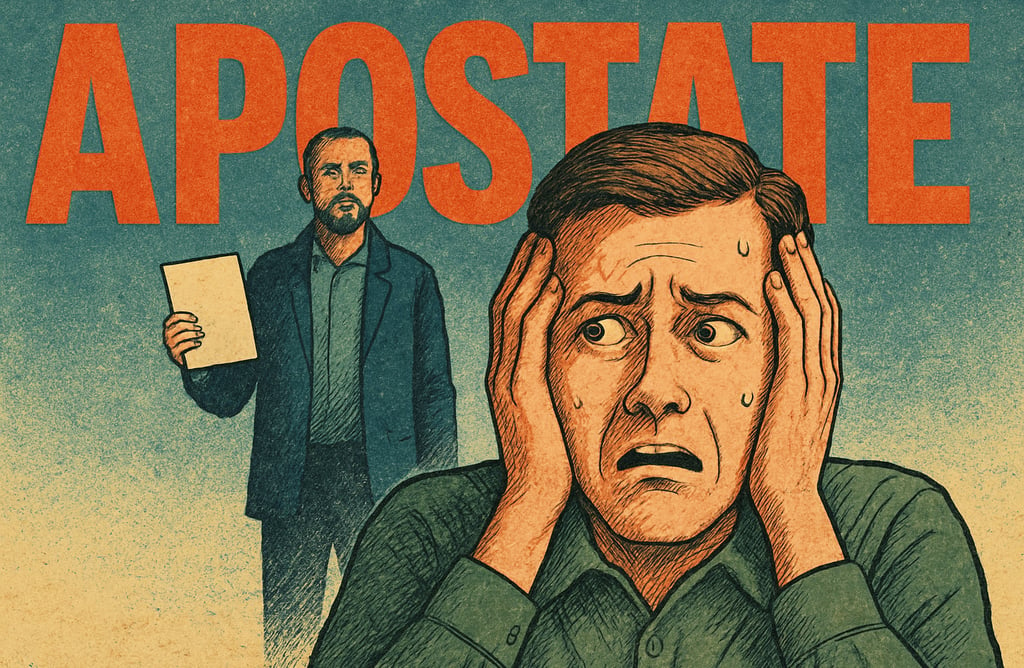The A-Word: Why “Apostate” Is So Scary
This is Part Two in a three-part series exploring what it means to be labeled an "apostate" in Jehovah’s Witness culture. In Part One — "Apostate Lies": A Closer Look — I broke down how many so-called "apostate claims" are actually well-documented facts. In this piece, I zoom in on the word itself — why it carries so much fear, how it’s used, and why I’ve decided to stop running from it.
TTATT
Oliver
5/7/20252 min read


There’s a word in Jehovah’s Witness culture that carries more weight than nearly any other. It’s spoken in hushed tones, thrown around in elders’ backroom meetings, and feared more than words like atheist, immoral, or even Satanist. That word? Apostate.
Not everyone knows what it really means. Ask a Witness, and they might fumble through a definition like “someone who used to be one of us but turned against Jehovah.” Press further and you’ll hear that apostates are angry, mentally diseased, bitter liars spreading misinformation online. But the truth is, the word is vague by design. It's meant to scare, not clarify.
So what actually makes the A-word so terrifying?
1. It’s the nuclear option
The label “apostate” isn’t just a description — it’s a sentence. Once applied, it justifies total shunning, complete character assassination, and spiritual death. The moment someone is called an apostate, the community is no longer expected to love them, reason with them, or even look at them.
That’s not just power — it’s social annihilation.
2. It has no clear boundary
There’s no official list of beliefs or behaviours that qualify you as an apostate. You don’t have to start a YouTube channel or write a blog. You don’t even have to leave. You can be branded an apostate for asking a hard question in the wrong tone, quoting a 1990 Watchtower too accurately, or privately doubting the latest “new light.”
In other words, you might already be one — and that’s part of the fear.
3. It messes with your wiring
If you grew up in the organization, apostasy isn’t just a bad idea — it’s a kind of spiritual contagion. You’re trained to recoil from it like it’s radioactive. Even thinking a “wrong” thought can spark guilt, followed by panic, followed by self-policing.
It’s not enough to avoid apostates — you’re told not to read what they say, not to hear their voice, not to click their links. Ever wonder why? Maybe because deep down, they know we’re not lying. And that’s the real danger.
4. It says more about them than it does about us
What makes “apostate” so scary is not that it’s accurate — but that it’s convenient. It simplifies every messy situation into a clear villain narrative. It turns someone who’s questioning, hurting, or searching into a traitor. And once you believe someone is a traitor, you don’t have to feel empathy. Or doubt. Or love.
In other words, the A-word is the organizational get-out-of-compassion-free card.
So here’s the thing: I am an apostate. At least by their definition. But I don’t hate Jehovah’s Witnesses. I don’t lie. I don’t want to “tear down people’s faith” for fun. I’m not bitter — I’m calm, thoughtful, and deeply reflective. I just... saw too much. Asked too much. Read too much. And I couldn’t pretend anymore.
That doesn’t make me evil. It makes me honest.
So let’s stop being afraid of the word. Let’s reclaim it, dissect it, laugh at it if we need to. The scariest thing about “apostate” isn’t what it says about us — it’s what it says about the people who use it.
